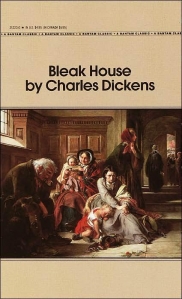 I only have a few moments to weigh in a bit on Bleak House: I took the day off work yesterday as i wasn’t feeling entirely well, and I had visions of spending most of my afternoon curled up with the book. Alas, I instead got to thinking and writing about Brian Burke; several hours and 3000 words later, I had piffled away most of my reading time.
I only have a few moments to weigh in a bit on Bleak House: I took the day off work yesterday as i wasn’t feeling entirely well, and I had visions of spending most of my afternoon curled up with the book. Alas, I instead got to thinking and writing about Brian Burke; several hours and 3000 words later, I had piffled away most of my reading time.
The story has advanced but slightly in this small segment of the book; we have learned that Esther’s suitor is Dr. Allan Woodcourt, a young surgeon who took care of Miss Flite, the deranged woman who loiters about Chancery speculating comically about what is to come on the Day of Judgement. We have learned also that one of Esther’s charges, Richard Carstone is not terribly interested in pursuing a career in medicine, and arrangements are made instead to have him withdraw from that with a view to pursuing articles of law.
Chapter 16 is entirely concerned with Lady Dedlock’s mysterious visit to London to find out more about the law copyist who died alone of an overdose (in an earlier chapter). This chapter, like all of the chapters concerning the Dedlocks to date, is recounted in the present tense. I suppose that Dickens chose to use this device for a reason, perhaps to heighten the tension and suspense in an otherwise lackadaisical narrative. These chapters are also recounted from the perspective of an omniscient narrator who refers almost familiarly to the Dedlocks. By contrast, the chapters about Esther allow the reader into Esther’s thoughts, in the manner of an ongoing confessional, and are recounted in the past tense. I am finding the constant shifting between perspectives and tenses to be somewhat jarring, and I suspect that Dickens himself was ultimately less than satisfied with the result, which (to my mind) heightens the reader’s awareness of the artifice surrounding the book and thus distances him or her from it.
My favourite passage from this section occurs in Chapter 15. Esther’s guardian Mr. Jarndyce is gently challenging Skimpole (the carefree freeloader) about Skimpole’s unorthodox economic theories. In particular, Skimpole has expressed the belief that meaning to disburse funds ought to be as satisfactory to their intended recipient as the actual transfer of coin; Jarndyce points out that things would not go well for Skimpole if, following the same logic, the butcher were to simply intend to give him meat. Skimpole responds:
“My dear Jarndyce,” he returned, “you surprise me. You take the butcher’s position. A butcher I once dealt with occupied that very ground. Says he, ‘Sir, why did you eat spring lamb at eighteen pence a pound?’ ‘Why did I eat spring lamb at eighteen pence a pound, my honest friend?’ said I, naturally amazed by the question. ‘I like spring lamb!’ This was so far convincing. ‘Well, sir,’ says he, ‘I wish I had meant the lamb as you mean the money!’ ‘My good fellow,’ said I, ‘pray let us reason like intellectual beings. How could that be? It was impossible. You HAD got the lamb, and I have NOT got the money. You couldn’t really mean the lamb without sending it in, whereas I can, and do, really mean the money without paying it!’ He had not a word. There was an end of the subject.”
There is an absurdist humour underlying this passage that must be part of a genetic bequest to English authors, as it could just as easily be drawn straight from the pages of a Douglas Adams novel.
New characters are still being introduced, making me wish I had taken Mike’s suggestion and started drawing up a chart to keep track of the dramatis personae; I am still managing to keep everybody straight, but only barely. I really hope Dickens starts killing a few folk off if he plans on introducing any more walk-ons.
I’ll read more after tonight’s edition of the Battle of Ontario: Toronto at Ottawa.

I think I would have been just like Dad and put the book down a long time ago. With passages like that I would have gone nuts trying to understand it. I mean, I know what the words are. I can plainly see them and know what each of them mean, but all together, forget it. I’ll stick to Dick Francis. 😉
Oddly enough, I agree too — when I’m very tired and trying to read it, I start to read words instead of phrases and lose the meaning; it makes me sleepy in a hurry. I almost need to skim in order to get the sense of it, and then I can’t remember the individual words by the end, but the story sticks with me a bit better.
Reading books outside the contemporary period makes me appreciate how culture affects my understanding; when I was in high school, I used to read a lot of H.P. Lovecraft, who was a writer by profession who got paid by the word. Thus his prose tended to be full of flowery language and excessive description, and understanding that aspect of his writing helped me get through it (I still recall the slow madness of Alonzo Typer in his eponymous diary). When I read stuff written natively in English and published since, say, the 1960s, I have no problem getting through — we all have the same underlying assumptions; reading Dickens is for me more difficult than translated Yukio Mishima, as it’s a world wholly foreign to me.